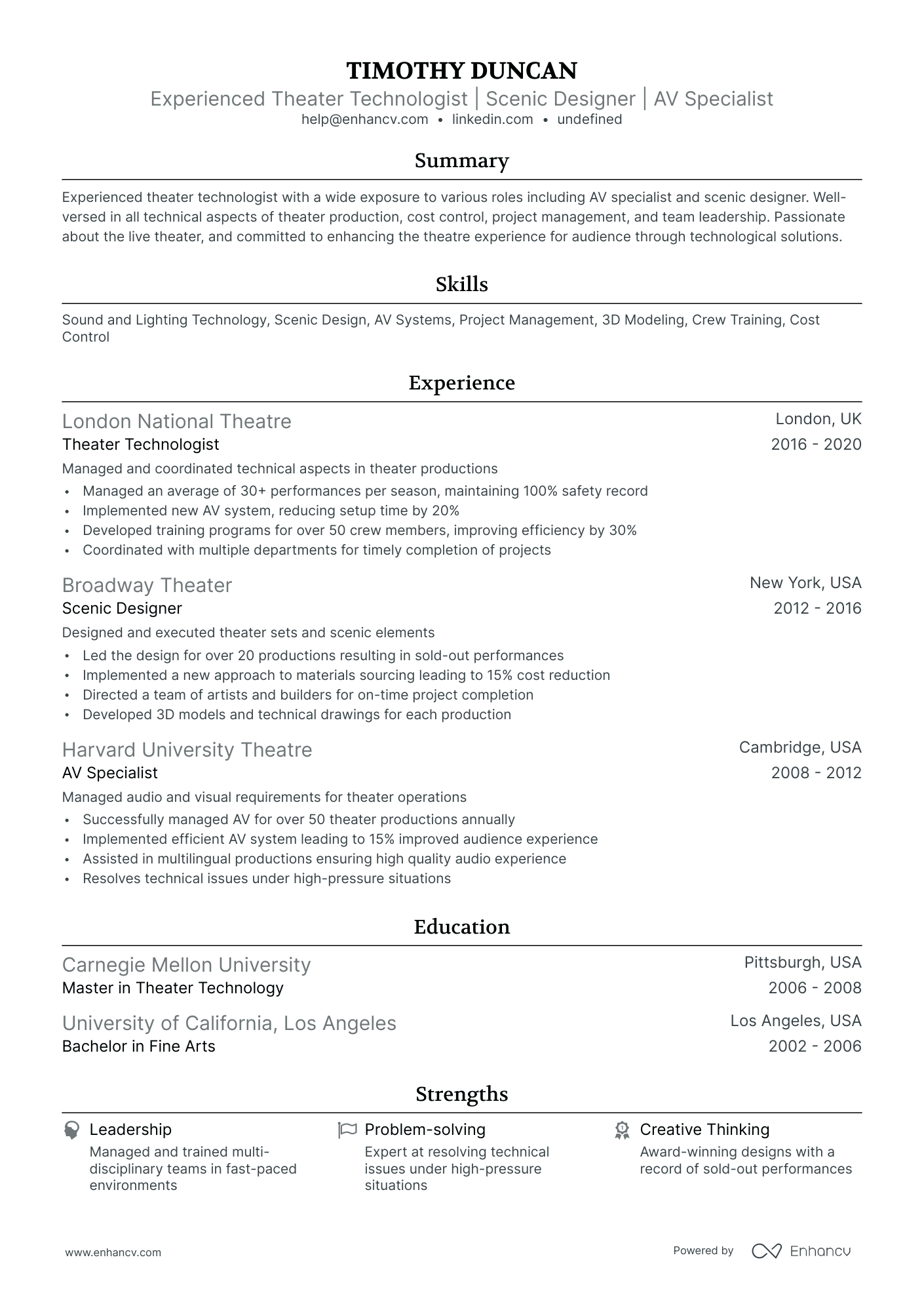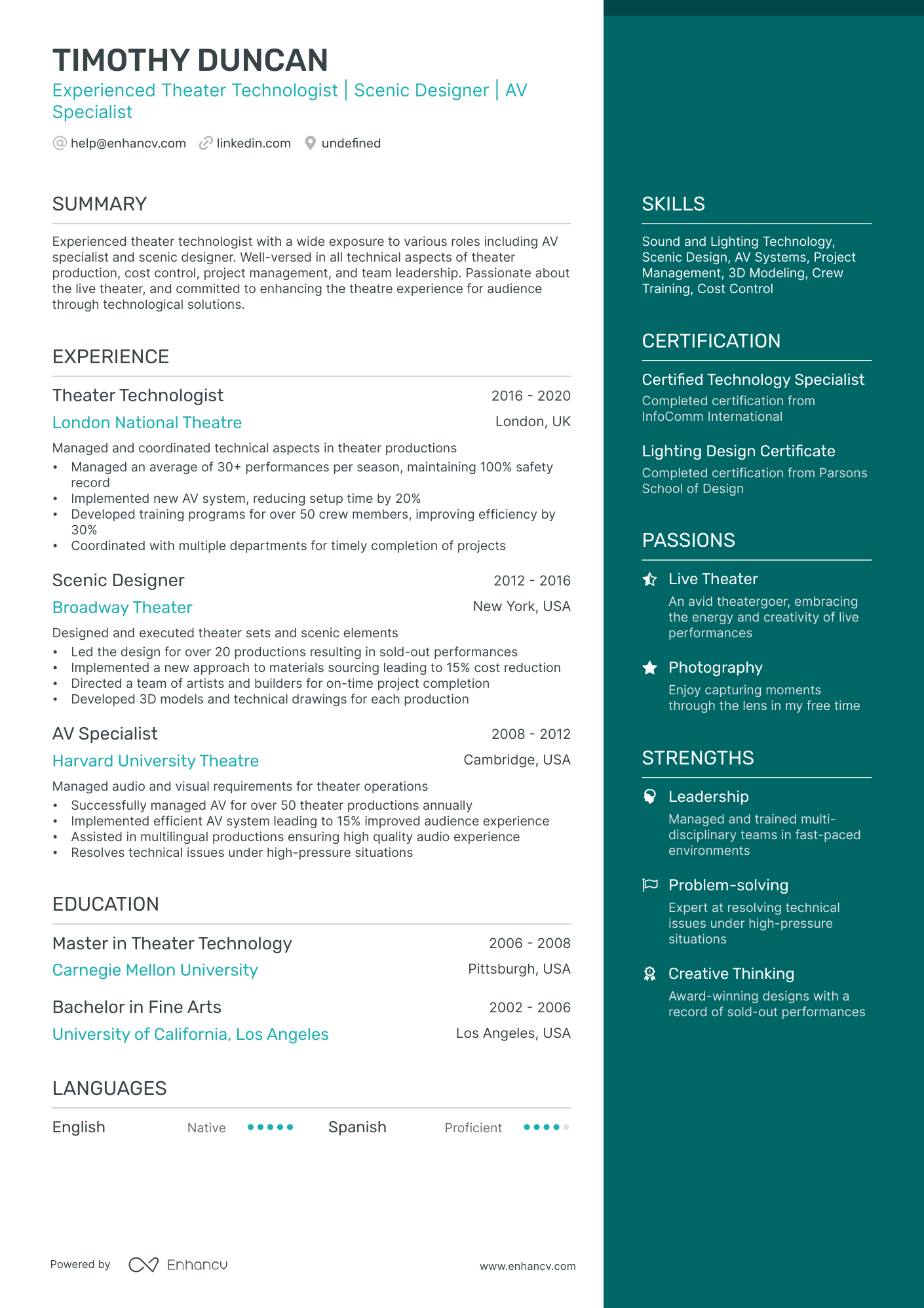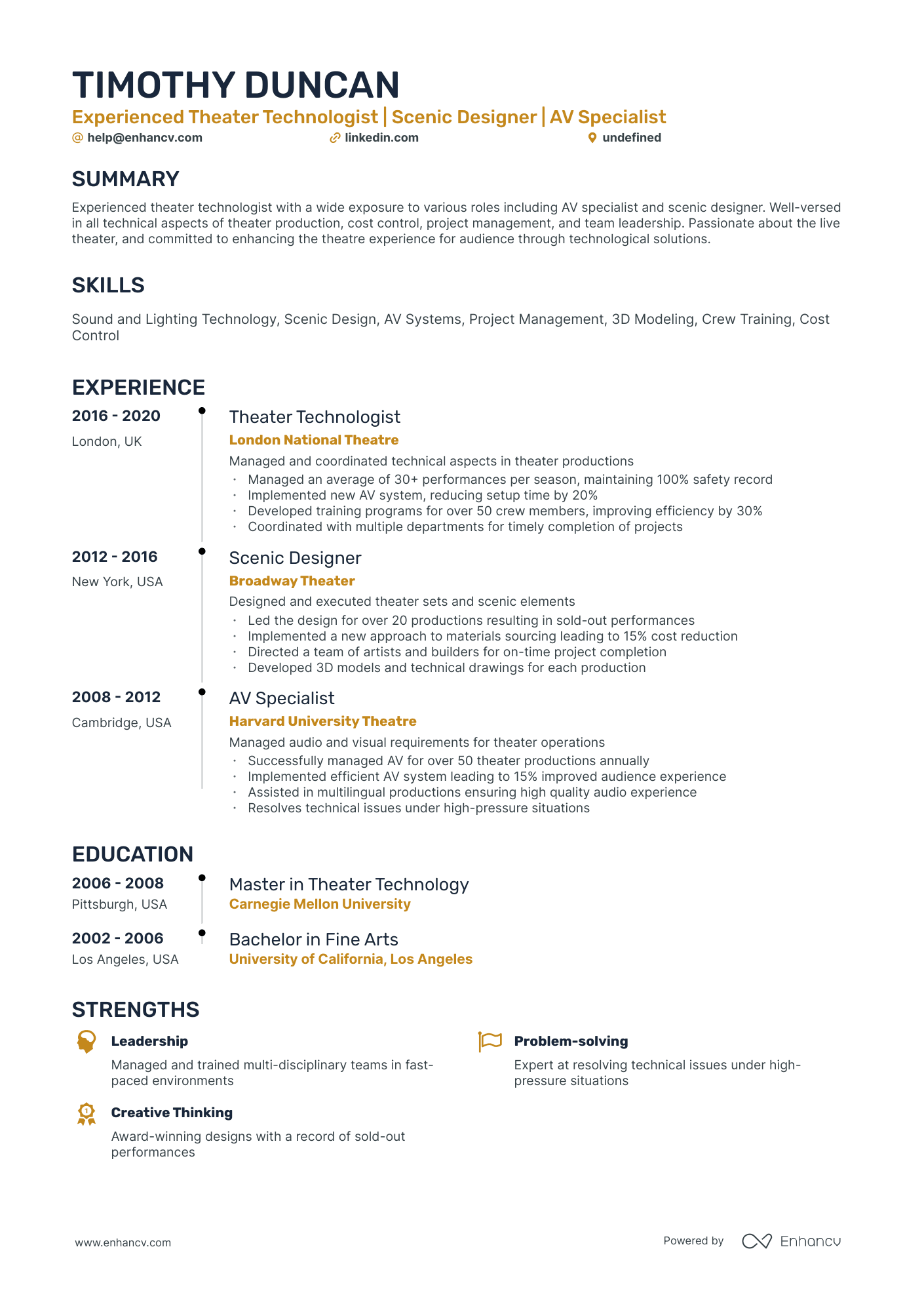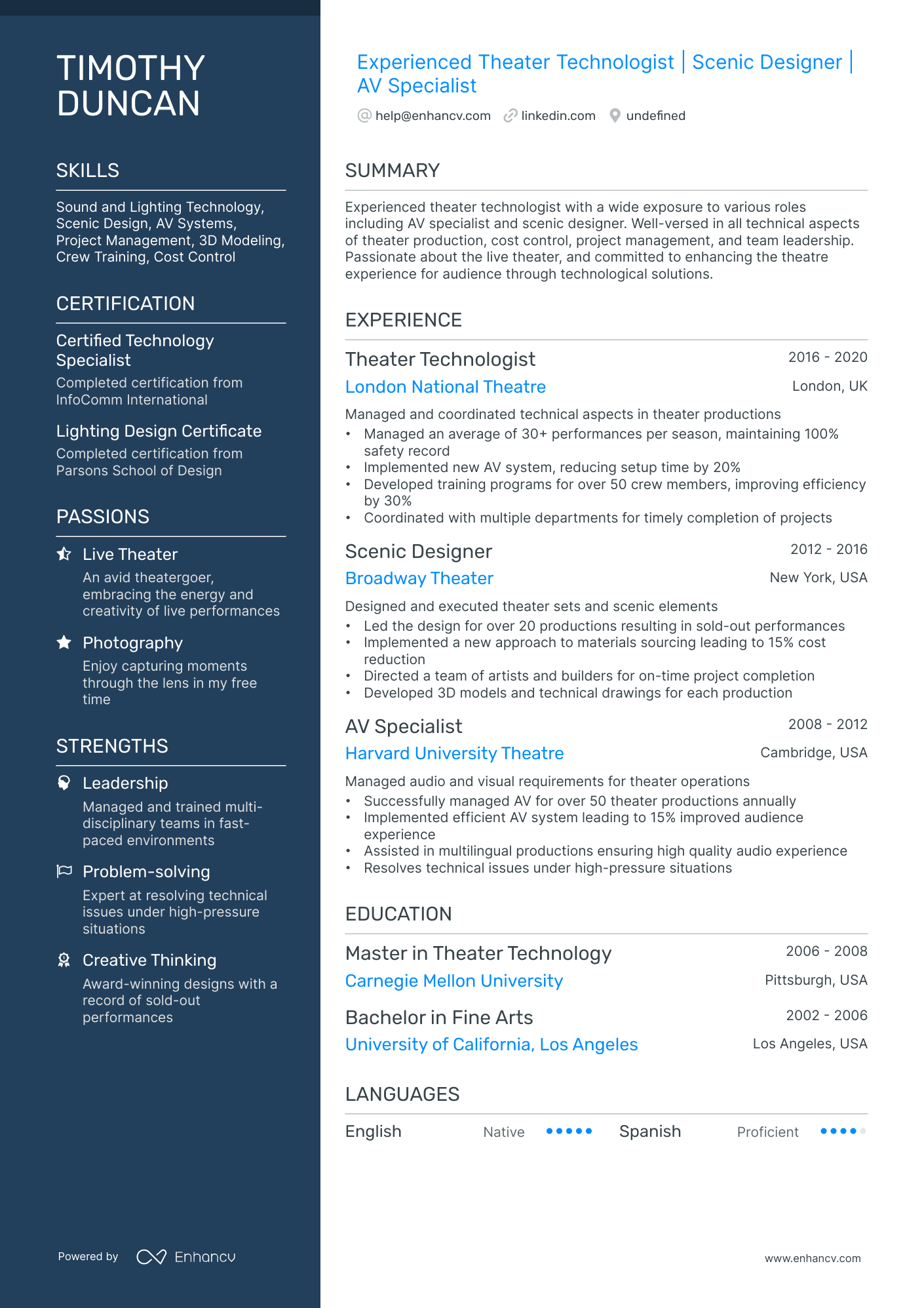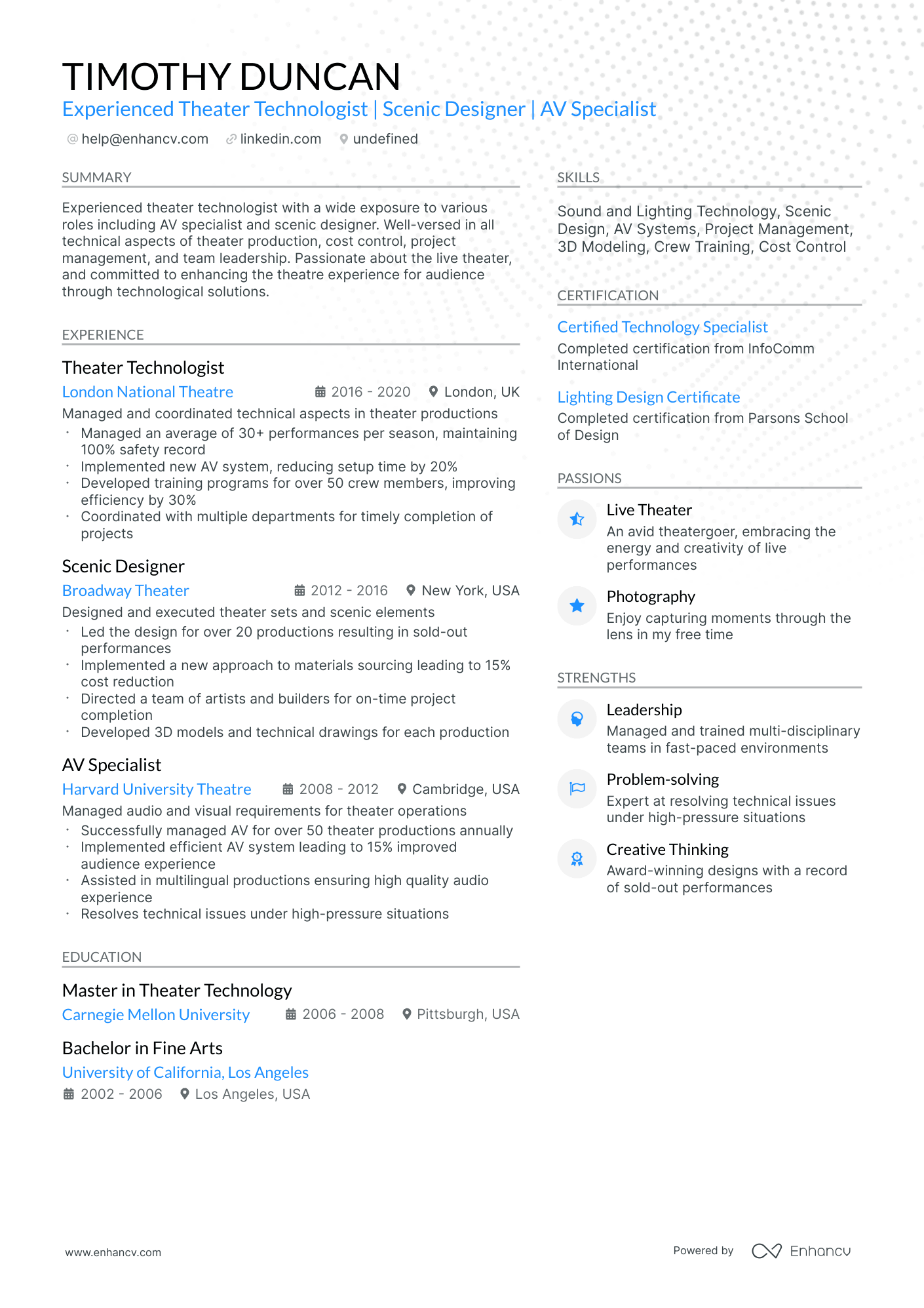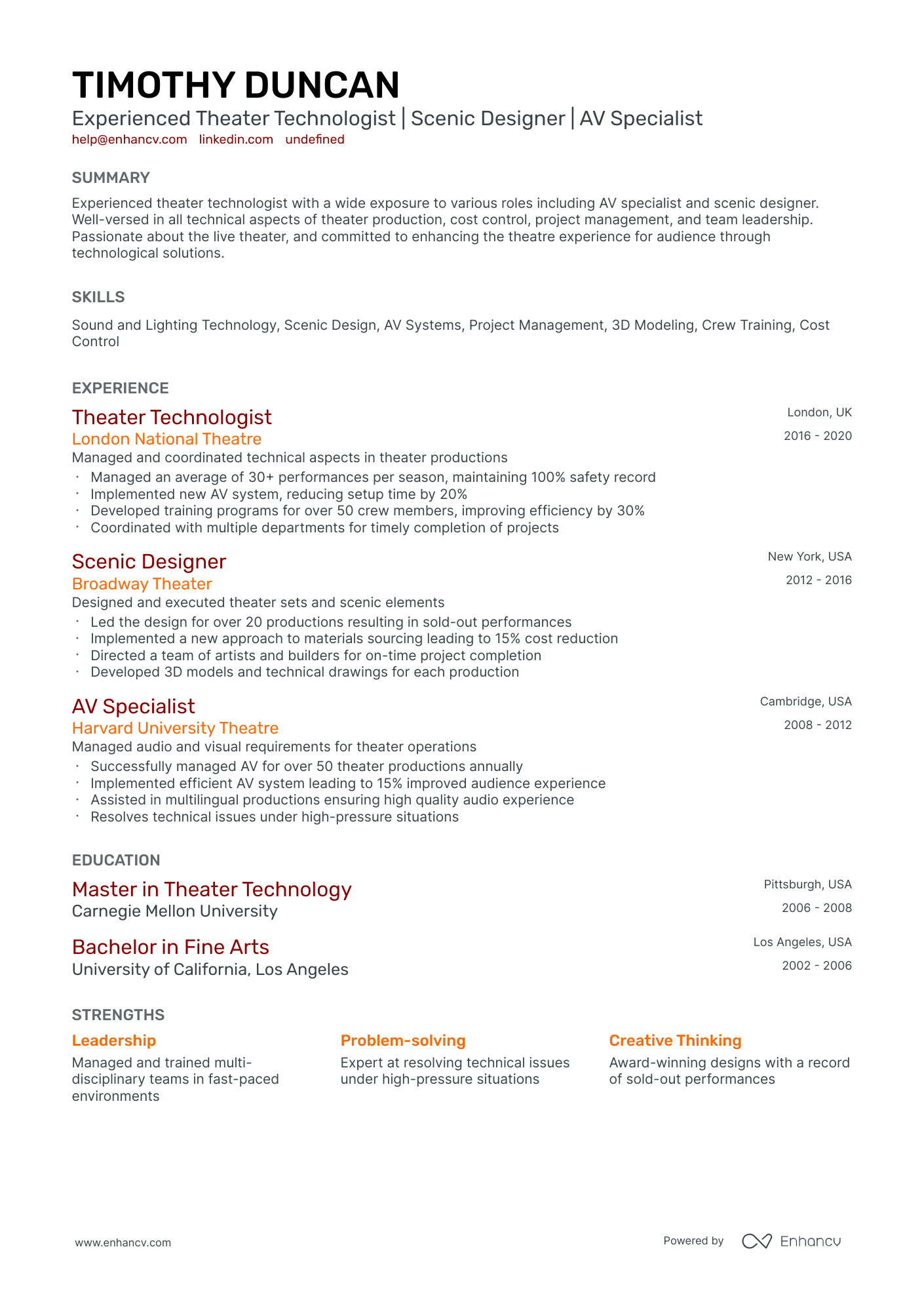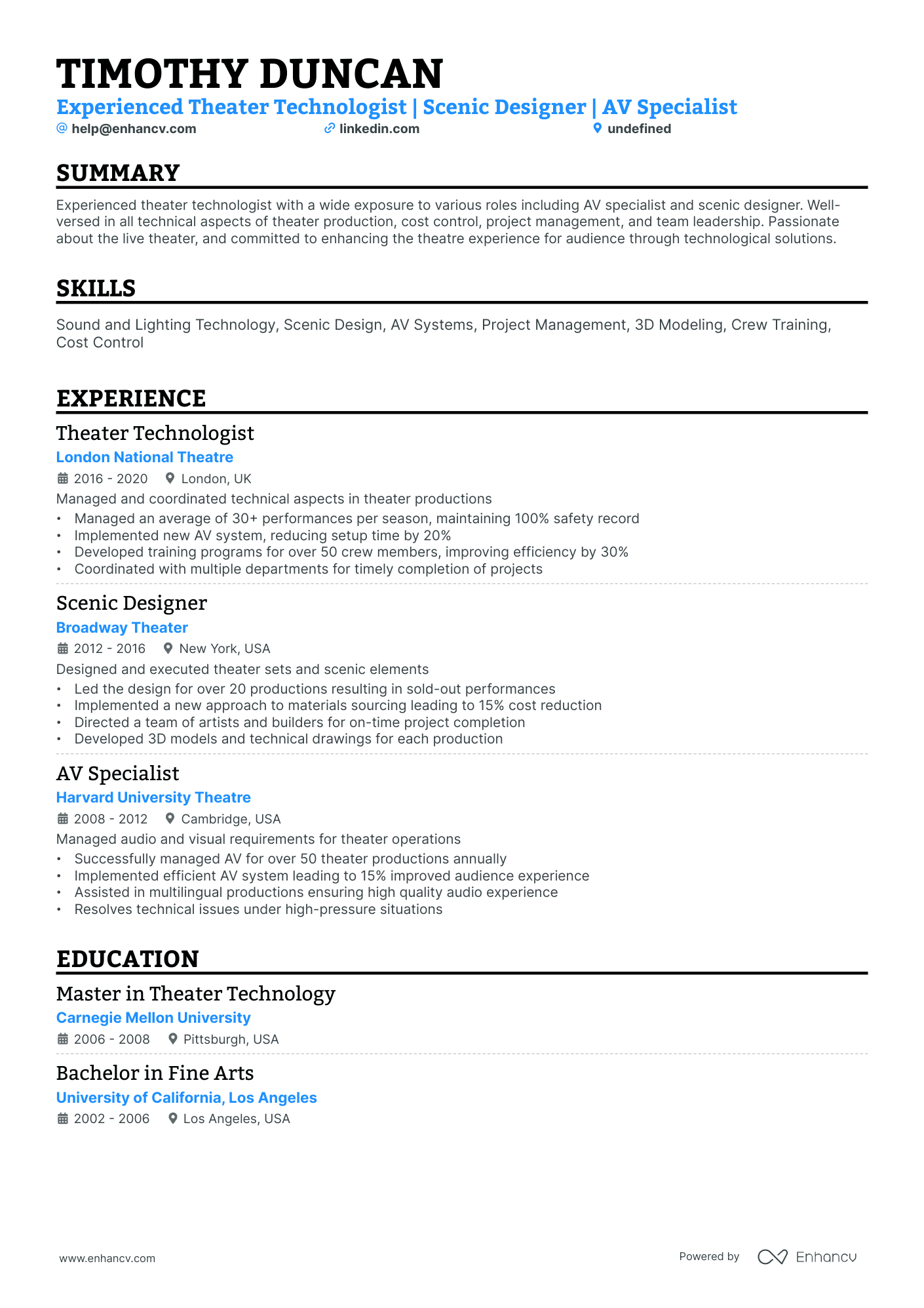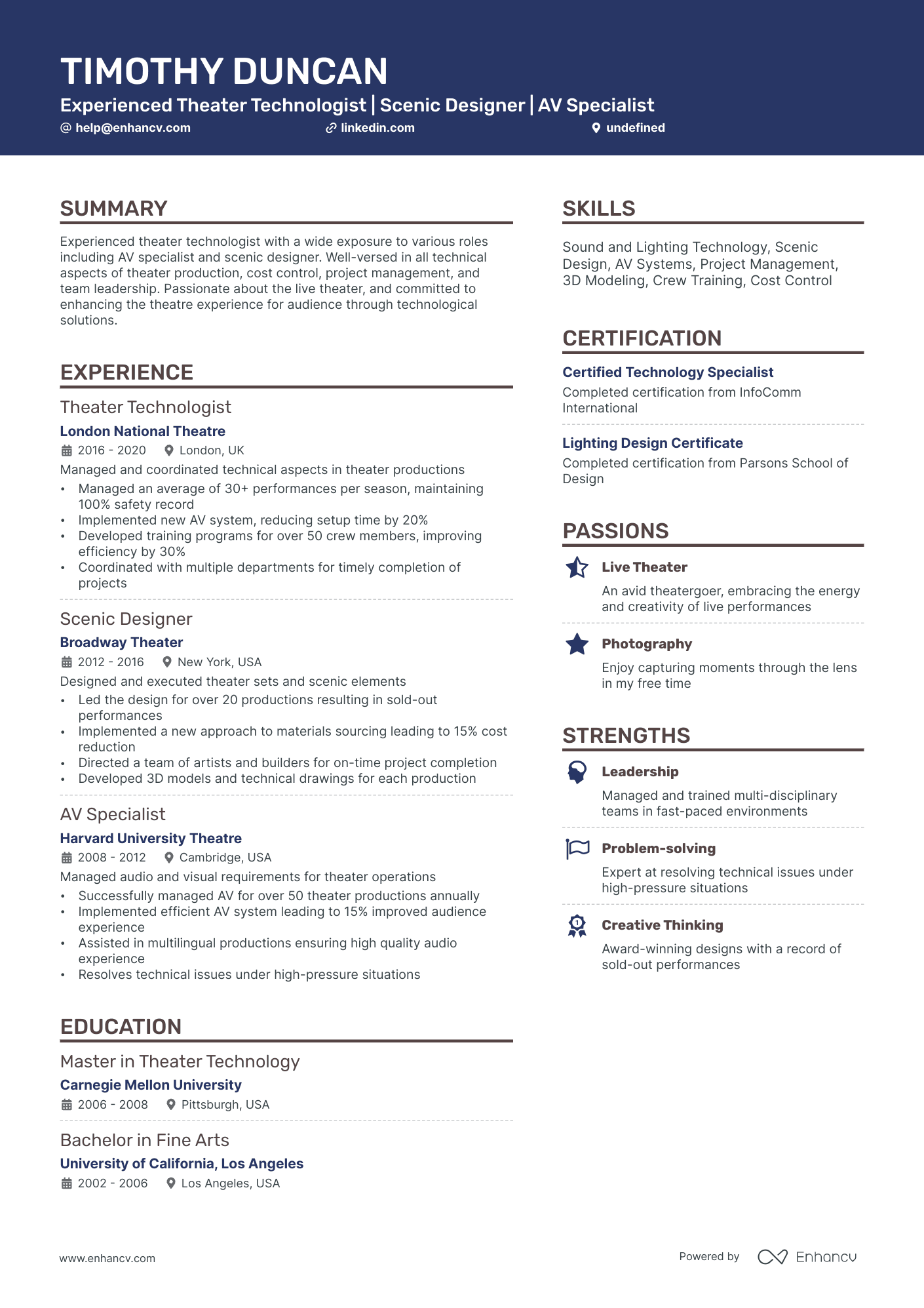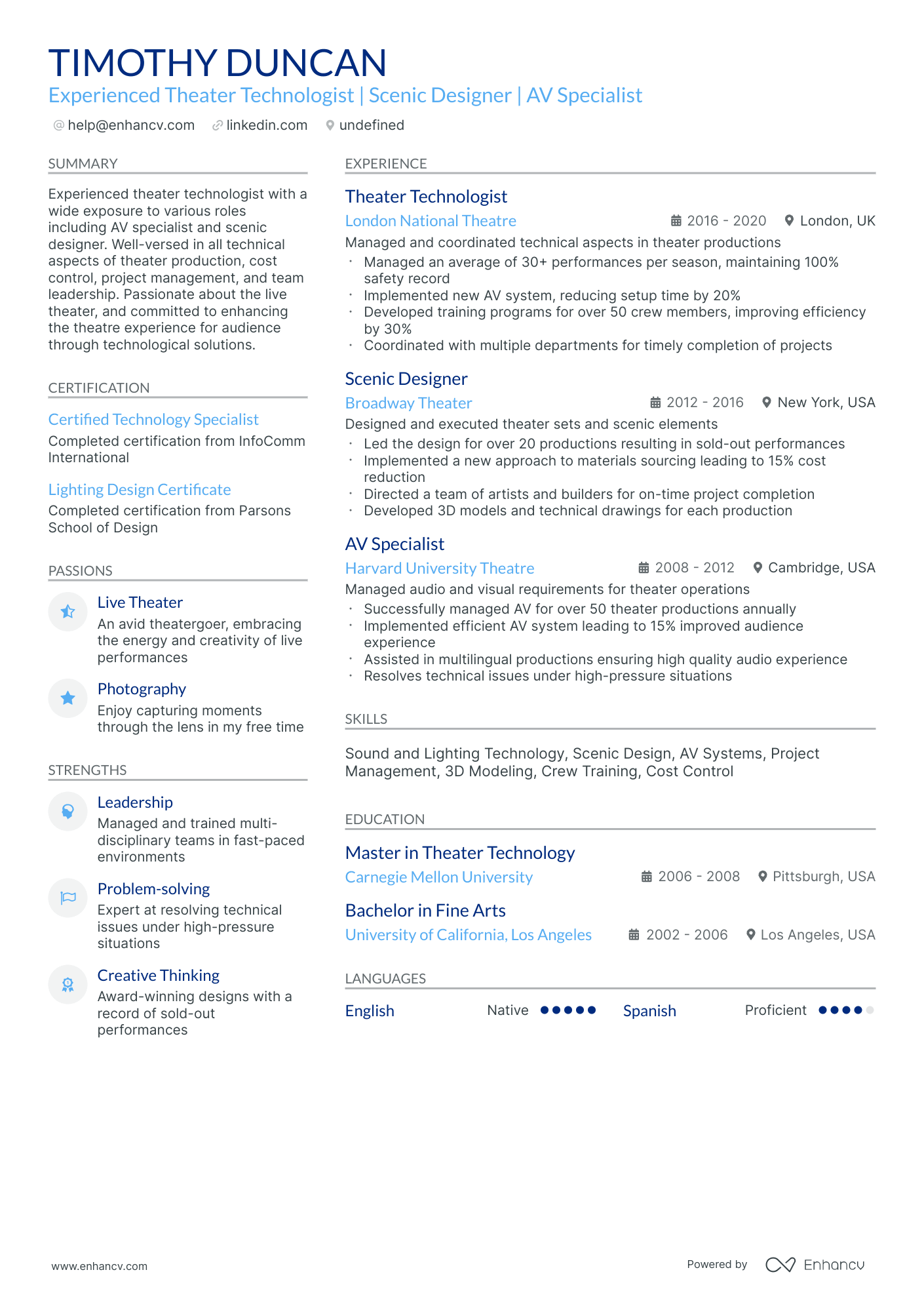Job seekers in technical theatre often struggle with concisely explaining their diverse skills, from technical knowledge like lighting and sound operation to management capacities like supervising crews and coordinating with directors. Our guide can help address this challenge by providing industry-specific guidance on how to effectively communicate these varied abilities in a resume format, making it easier for potential employers to understand your unique skill set.
Dive into our comprehensive guide to crafting a standout technical theatre resume:
- Discover technical theatre resume samples that have secured positions at top-tier companies.
- Master the aesthetics of your resume layout for maximum impact.
- Strategically present your achievements and skills across various resume sections.
- Convey to recruiters why you're the perfect fit for the job.
Recommended reads:
Styling your technical theatre resume: layout and format
Pondering the ideal length for your technical theatre resume? Experts suggest keeping it between one and two pages. Opt for the two-page format if you boast over a decade of pertinent experience. Moreover, the resume format you choose is pivotal in showcasing your experience. Consider the:
- Reverse-chronological resume format to spotlight your career journey;
- Functional skill-based resume format if you're light on experience but want to emphasize skills;
- Hybrid resume format to provide recruiters a comprehensive view of both your experience and skills.
Here are some additional tips for your technical theatre resume layout:
- Keep your headline straightforward: mention the job you're targeting, a notable certification abbreviation, or your professional specialty;
- Always customize your technical theatre resume for the specific role, aligning job requirements with your experience in various resume sections;
- After finalizing your resume, save it as a PDF (unless instructed otherwise) to maintain its readability and layout consistency.
Upload your resume
Drop your resume here or choose a file. PDF & DOCX only. Max 2MB file size.
Pro tip
Your resume will likely be processed by an Applicant Tracking System (ATS). Ensure your header, summary, or objective incorporates essential skills required for the role.
Essential technical theatre resume sections for a comprehensive overview:
- Header: Enables recruiters to swiftly access your contact details and peruse your latest work portfolio.
- Summary or Objective: Offers a snapshot of your career milestones and aspirations.
- Experience: Demonstrates alignment with job prerequisites and highlights your tangible contributions.
- Skills: Captures the full spectrum of your expertise, making you a compelling technical theatre candidate.
- Education & Certifications: Bridges potential experience gaps and underscores your dedication to the field.
What recruiters want to see on your resume:
- Experience with Different Stages and Venues: Whether a candidate has experience with various types of theatre stages and venues, such as proscenium arches and black box theaters.
- Technical Skills: Proficiencies in areas like lighting design, sound engineering, set construction, rigging, or costume and makeup design.
- Software Proficiency: Knowledge of industry software like AutoCAD, VectorWorks, QLab, or ETC EOS Family Console Software for lighting control.
- Certifications: Relevant technical theater certifications, such as in safety (e.g. first aid, fire safety), equipment use (e.g. powered access license), or specific technical areas (e.g. Association of British Theatre Technicians qualifications).
- Collaborative Ability: Evidence of strong teamwork and communication skills, demonstrated through past experiences working collaboratively on productions.
Recommended reads:
Writing your technical theatre resume experience
Here are some quick tips on how to curate your technical theatre professional experience:
- Always ensure that you quantify your achievements by implementing the Situation-Task-Action-Result framework;
- When writing each experience bullet, make sure you're using active voice;
- Stand out by including personal skills you've grown while at the job;
- Be specific about your professional experience - it's not enough to say you have great communication skills, but rather explain what your communication track record led to?
Wondering how other professionals in the industry are presenting their job-winning experience? Check out how these technical theatre professionals put some of these best practices into action:
- Collaborated with production team to design lighting and sound setups for theater performances.
- Operated and maintained audiovisual equipment, ensuring seamless execution of live shows.
- Assisted in the construction and installation of stage sets, resulting in efficient scene changes.
- Managed backstage operations, coordinating cues and transitions during performances.
- Designed and implemented complex lighting designs for high-profile theater productions.
- Supervised a team of technicians, ensuring proper execution of lighting and sound cues.
- Collaborated with directors to create immersive environments that enhanced audience experience.
- Utilized advanced rigging techniques to safely suspend aerial performers during shows.
- Managed all aspects of stage management, including scheduling and coordinating rehearsals.
- Implemented effective communication systems to facilitate smooth operations during performances.
- Collaborated with production team to troubleshoot technical issues, minimizing downtime.
- Coordinated costume changes and ensured quick backstage transitions, maintaining show flow.
- Designed and built intricate stage sets, incorporating innovative techniques and materials.
- Managed a team of carpenters and painters, ensuring timely completion of set construction.
- Collaborated with scenic artists to create visually stunning backdrops for theatrical productions.
- Implemented efficient storage and organization systems for props and set pieces.
- Led the technical crew in executing complex automation systems for stage movements.
- Designed and programmed custom control systems, enhancing precision and safety on stage.
- Collaborated with engineers and technicians to integrate robotics into live theater performances.
- Trained and mentored junior staff members in operating and maintaining automation equipment.
- Managed all audio production aspects, including sound design and mixing for large-scale events.
- Led a team of sound technicians, ensuring high-quality audio reinforcement during performances.
- Designed and implemented immersive soundscapes, enhancing storytelling within productions.
- Integrated wireless microphone systems, resulting in improved clarity and mobility for performers.
- Operated advanced video projection systems, synchronizing visuals with live theater performances.
- Collaborated with multimedia designers to create dynamic video content for stage productions.
- Managed video playback and cueing systems, ensuring seamless integration with live action.
- Developed custom video mapping setups, transforming stage surfaces into immersive displays.
- Coordinated and executed the setup and programming of lighting consoles for theater productions.
- Collaborated with lighting designers to achieve desired visual effects and moods on stage.
- Managed lighting inventory and maintenance, ensuring all equipment was in working order.
- Trained and supervised technicians in lighting operations and troubleshooting techniques.
- Implemented advanced automation systems for stage movements, enhancing production capabilities.
- Developed and maintained control interfaces utilizing industry-standard software and hardware.
- Collaborated with technical staff to design and fabricate custom automation components.
- Performed regular system inspections and maintenance to ensure optimal performance.
- Assisted in the installation and operation of theatrical rigging systems for various productions.
- Maintained safety protocols while operating counterweight and motorized rigging systems.
- Collaborated with rigging team to ensure smooth and precise flying of scenery and performers.
- Participated in load-in and strike processes, facilitating efficient stage setup and teardown.
Quantifying impact on your resume
<ul>
Crafting the experience section for novice technical theatre candidates
Lack of extensive experience doesn't equate to an empty resume. Here's how you can enrich your experience section:
- Volunteer Roles: Community involvement often equips you with valuable interpersonal skills, and sometimes even technical ones, relevant to the job.
- Academic Projects: Highlight significant university projects that contributed to the field, showcasing your hands-on experience.
- Internships: Even short-term internships can be invaluable. If they're pertinent to the role, they deserve a spot on your resume.
- Past Jobs: Even if unrelated to the technical theatre, these roles can demonstrate transferable skills that are beneficial for the position.
Recommended reads:
Pro tip
Highlight what sets your experience apart. Incorporate metrics, feedback, and the tangible value you've added to organizations. This specificity ensures your resume remains pertinent and memorable.
Highlighting your technical theatre skills
Recruiters look for a mix of technical and personal skills in your technical theatre resume.
Technical or hard skills are specific tools or software you use for the job. They're easy to spot through your education and work achievements.
On the other hand, soft skills like communication or adaptability show how you work with others. They come from both your personal and work life.
To showcase your skills:
- Have a skills section for technical abilities and another for personal strengths.
- Be clear about your skills. Name the exact tools you use and describe how you've used your soft skills.
- Avoid common terms like "Microsoft Office" unless the job specifically asks for them.
- Choose up to ten key skills and organize them in different sections of your resume.
Make your resume pop with top technical and personal skills that recruiters value.
Top skills for your technical theatre resume:
Lighting Design
Sound Design
Set Design
Carpentry
Costume and Makeup
Prop Design and Maintenance
Stage Management
Knowledge of Safety Procedures
Technical Drawing & CAD
Understanding of Theatre History and Styles
Creativity
Attention to Detail
Collaboration
Problem Solving
Time Management
Communication
Adaptability
Leadership
Project Management
Stress Management
Pro tip
When detailing your skills, align them with the job's requirements. Emphasize unique technical proficiencies and provide examples of your soft skills in action.
Highlighting technical theatre-specific certifications and education
Your resume education section can be a treasure trove of skills and experiences relevant to the role. Here are the best practices when it comes to featuring it on your resume:
- Highlight advanced qualifications, detailing the institution and duration.
- If you're currently pursuing a degree, mention your expected graduation date.
- Consider omitting unrelated degrees.
- If your academic journey boasts significant achievements, especially in research, elaborate on them.
What's more, shocasing relevant industry certifications can bolster your credibility, even if you lack extensive work experience.
To effectively present your certifications:
- Place pivotal industry certifications prominently in a dedicated section.
- If a certification is particularly impressive, consider featuring it near your name or within the header, summary, or objective.
- Provide details, where relevant, to underscore alignment with the role.
- Recent certifications should be given advantage, as they show your up-to-date knowledge.
Both education and certification sections highlight your commitment to professional growth, a trait valued by employers. Below, explore some of the most current and sought-after technical theatre certifications to enhance your application:
Best certifications to list on your resume
Pro tip
If you have plenty of certifications, prioritize the most relevant and industry-recognized ones. Arrange them based on their relevance to the job at hand.
Recommended reads:
Should you add a summary or objective to your technical theatre resume?
Choose between:
- Resume summary to match job needs with your top wins.
- Resume objective to share your career goals.
Both should tell recruiters about your best moments. Keep them short, around five sentences. Check out our sample structures for guidance.
Resume summary and objective examples for a technical theatre resume
How to include other relevant sections for your technical theatre resume
Apart from the standard sections listed in this guide, you have the opportunity to get creative when building your profile.
Select additional resume sections that you deem align with the role, the department, or the company culture.
Here are the ones we recommend:
- Language skills - use a profficiency framework to indicate your aptitude level;
- Hobbies and interests - you can share more about your favorite books or how you spend your time. It's great for culture alignment;
- Volunteering - helps you highlight the causes you care about and hints at people skills you gained such as teamwork, emotional intelligence, and organizational skills;
- Awards - the space for your most prominent technical theatre professional accolades and achievements.
Make sure that these sections don't take too much away from your experience, but instead build up your technical theatre professional profile. You can add them as a second column to your resume, or on a second page.
Key takeaways
- Your resume should be a curated narrative, highlighting your alignment with the role's requirements.
- Strategically position your skills, balancing both technical and interpersonal strengths.
- Be selective in detailing experiences, focusing on relevance and impact.
- Utilize the summary or objective to offer a snapshot of your professional essence.
- Across all sections, prioritize authenticity and clarity, ensuring your resume resonates with the technical theatre role you're eyeing.
